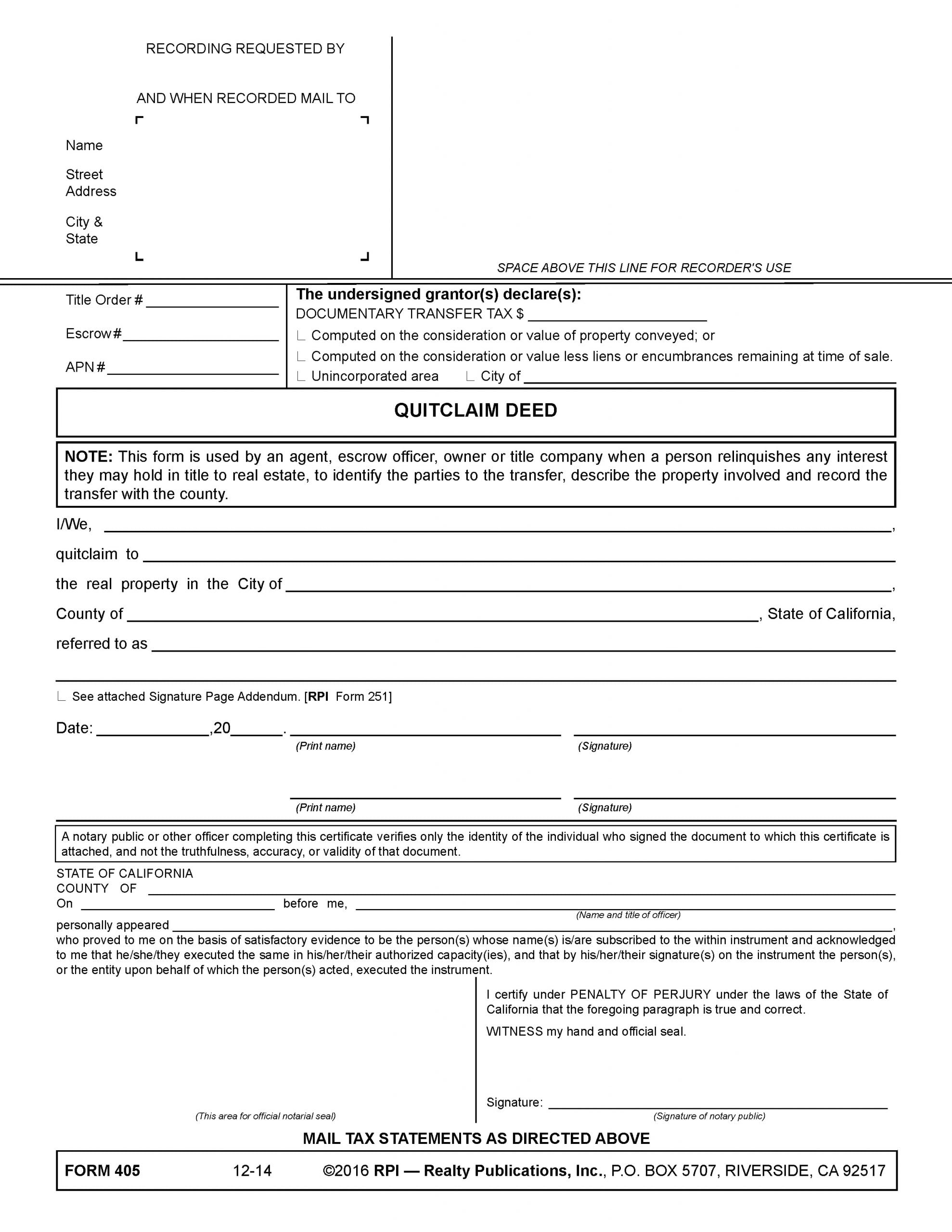This form is used by an agent, escrow officer, owner or title company when a person relinquishes any interest they may hold in title to real estate, to identify the parties to the transfer, describe the property involved and record the transfer with the county.
A deed as a transfer
Real estate is conveyed when title is transferred from one individual to another. [Calif. Civil Code §1053]
The transfer of an interest in title to real estate contained in writing is called a grant or conveyance, no matter the form of writing. [CC §1053]
A deed is itself the grant which transfers title to property. [Hamilton v. Hubbard (1901) 134 C 603]
Title by deed passes either:
- voluntarily by agreement with the owner, such as in a sale in the open market or foreclosure on a trust deed; or
- involuntarily, such as the enforcement of a creditor’s judgment or tax lien.
No matter the form of writing, the individual conveying real estate is called the grantor. The individual acquiring title is called the grantee.
To be valid, a deed needs to:
- be in writing;
- identify the grantor and the grantee;
- contain a granting clause stating the grantor’s intention to convey;
- adequately describe the real estate involved;
- be signed by the grantor; and
- be handed to and accepted by the grantee.
Form deeds used in real estate transactions fulfill these requirements by containing words of conveyance and identifying the parties and a description of the real estate. Their size and format permit the document to be notarized and recorded. [See RPI Form 404 and 405]
Grant deeds vs. quitclaim deeds
The words of conveyance in a deed depend on whether the deed used is a grant deed or a quitclaim deed.
A grant deed is used to pass a fee estate from the grantor to a grantee unless a lesser interest is stated in the deed. Use of the word “grant” in the granting clause, without noting a lesser interest in the description of the property, indicates the conveyance of a fee simple interest in the described property. [See RPI Form 404]
Alternatively, a quitclaim deed conveys whatever interest the grantor may hold in the real estate. The words of conveyance historically used in a quitclaim deed are “remise, release and otherwise quitclaim.”
However, only the word “quitclaim” is required as the word of conveyance. A quitclaim deed does not contain the word “grant” since the conveyance includes no implied warranties under a quitclaim deed. Yet, the parties to a quitclaim deed are still the “grantor” and the “grantee.” [See RPI Form 405]
The type of deed used to convey property is evidence of the future role the individual conveying title undertakes. Thus, a grant deed conveys real estate with covenants relating to the interest conveyed.
A quitclaim deed, however, simply conveys any interest in real estate without any assurance the individual named as grantor holds an interest to convey.
Ultimately, a quitclaim deed terminates any interest in the real estate described in the deed which may be held by the grantor signing and delivering the quitclaim deed. Unlike a grant deed, a quitclaim deed operates to release to the grantee all interest the grantor may hold in the property. [Platner v. Vincent (1924) 194 C 436]
A quitclaim deed passes whatever title, legal or equitable, the grantor possessed on execution (signing and delivering) of the quitclaim deed.
Use of a quitclaim deed
Agents, escrow officers, owners or title companies use the Quitclaim Deed form published by RPI when a person relinquishes whatever interest, if any, they may hold in title to real estate. [See RPI Form 405]
The form identifies the parties to the transfer, describes the property involved and allows the individuals to record the transfer with the county. [See RPI Form 405]
Form navigation page published 05-2021. Updated 01-2026.
Form last revised 2016.
Form-of-the-Week: Grant Deed and Quitclaim Deed – Forms 404 and 405
Brokerage Reminder: Grant deed vs. quitclaim deed – deeds of conveyance
Article: Grant deed vs. quitclaim deed
Recent Case Decision: Is a recorded grant deed necessary to prove title to a property?
Word-of-the-Week: Grant deeds















I was given a quick clean beat in 2017 the appraiser’s office didn’t accept it because due to an error in the property description only issue is they sent it to the wrong address so the mortgage holder had no idea that they had sent it back I am recently just finding out myself the home is now on foreclosure and I’m just now figuring out what the error is it would have been nice for the appraiser’s office to be more forthcoming however they were not so I had to figure it out myself here it is 2021 and I’m about to refile my deed as of tomorrow hopefully the judge will give me a hearing and the bank will work with me so that I do not have to leave the only home I’ve lived in since moving to Florida 7 years ago I know that it does not cancel out the foreclosure but if anyone has any advice as to how I may be able to salvage my home I’d greatly appreciate it everyone be blessed